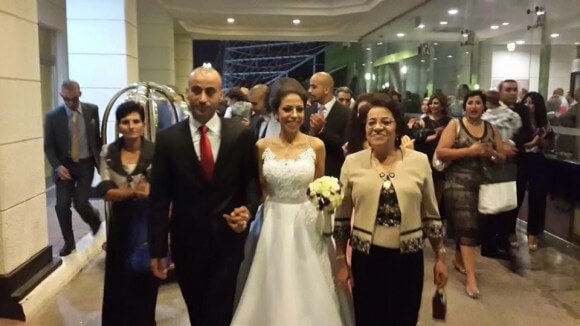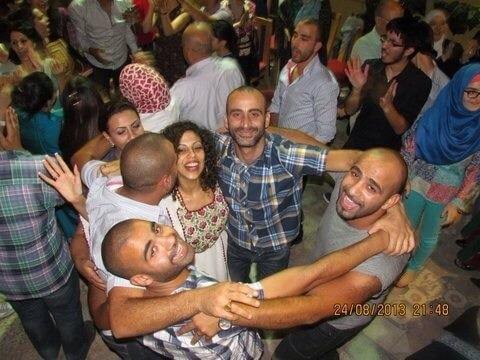
Love is never sure to go smoothly, but at least you’re not in Palestine where love can get a whole lot more complicated. Love is one of the most beautiful and pure emotions in the world and yet here it is often deliberately restricted due to the apartheid checkpoints and racist laws that Israel has imposed on the Palestinian people. Unfortunately in Palestine, we are even denied the right to love. Love under occupation is especially complicated when one’s lover has a different Hawiyyeh (ID card) from that of the other. It is simply because Palestinians in different places within Palestine have different IDs which identify where we live, in Gaza, or West Bank, or Jerusalem, or 48 lands.
IDs are a symbol of occupation and apartheid. Israel imposed these policies to make our lives more difficult, to control and restrict our movement, to make warm and connected feelings like love more painfully elusive. In Gaza and the West Bank, we have the same green Hawiyyeh. However, it is virtually impossible for a Palestinian from Gaza to visit another Palestinian in the West Bank and vice versa. Our people in Jerusalem hold a blue Hawiyyeh (Israeli Hawiyyeh). This Hawiyyeh is a temporary residence card. It has an expiration date and it can be withdrawn any time by the Israeli Occupation Forces. Israel uses these policies whenever they like which put our people in Jerusalem under permanent threat of being deprived the right to exist on their lands.
I’m writing this after spending one week in Istanbul with Louay Odeh and Areen Sweetat, a beautiful Palestinian couple, and their family who came from Jerusalem to visit them. Louay, who is originally from Lifta, one of Jerusalem’s villages, served 10 years in the Israeli prisons before he was released in the Shalit swap deal. His happiness of physical freedom was incomplete as he was expelled to the open-air prison in Gaza.
I had the honor to meet with Louay during a festival of freedom in Gaza right after the prisoner exchange took place on October 18, 2011. I can still remember how excited my dad was when he insisted on us accompanying him to that festival. “It is very much like those popular festivals of freedom that were organised for us when my comrades and I were released in the 1985 swap deal,” Dad recalled. Dad knows Louay’s uncle as they served 13 years together in Israeli jails. He also met Louay’s parents during the 70s in prison as they also experienced imprisonment in Israeli jails like tens of thousands of Palestinians.
Louay’s partner Areen who is a Palestinian from 1948 occupied lands waited for him during his entire imprisonment, clinging with hope that the dawn would come when his chains will break for them to unite together in peace and harmony. After two years of Louay’s release, they finally got married on August 25, 2013 despite all the obstacles they faced. Their marriage is a victory against Israel’s apartheid regime. It wasn’t easy for them to re-unite together. They had to find somewhere else outside to celebrate their wedding and live. Louay is no longer able to even enter his homeland Jerusalem after his expulsion to Gaza. Areen as well couldn’t enter the Gaza strip which is for Israel “a terrorist zone”. Therefore, if she did enter the Gaza Strip, Israel would confiscate her Israeli passport, and that means that she would never be able to see her family and homeland again. The sole solution they could find was living in Turkey until Palestine is free.

I also met one of Louay’s brothers, Oday, during his visit to Istanbul. He has become a good friend of mine. He lives in Jerusalem and I’m a refugee living in the Gaza Strip but studying currently in Turkey. We hold different IDs which means that it is almost impossible for us to meet within Palestine. Isn’t it insane that I and any friend from the other side of Palestine can only meet face to face in any country other than Palestine? And on the condition that we, the lucky few, manage to be granted a visa to that country? Isn’t it inhumane that the only way to talk with friends from the other side of Palestine is through social media?
On the day Oday’s flight to Jerusalem was scheduled, he tried to tease me as we were saying goodbye and said jokingly: “I’m going to Jerusalem but you are not.” This sentence brought me to tears. But he didn’t realize how painful his “joke” was. I went back home along with another friend from Jerusalem. I kept cursing borders, checkpoints, distance and occupation all the way back home. He tried to calm me down and said: “One day we will wake up from this nightmare and live the life we want; in dignity and freedom.” I smiled and remembered Rafeef Ziadah’s poem, “We, Palestinians, wake up every morning to teach the rest of the world life, sir.”
I wonder why it’s only us, Palestinians, who must think a billion times before letting our hearts open up to a Palestinian living on the other side of Palestine? Why should our love stories be so complicated, be so agonizing? When can we stop saying: Damn the checkpoints and the apartheid wall? When can we love wherever, whenever and whoever we want without worrying about apartheid checkpoints and the restrictions on our movement that Israel imposes on us? When will the words, “human rights” mean anything on the ground for us Palestinians? When will the international human rights organizations and people worldwide have the conscience to speak out and act against the racism and oppression that we endure on a daily basis? When will all people learn that love is the solution? When will we, Palestinians, be able to live and love in circumstances that you reading this have had your entire lives, but that I have never experienced for a single moment?


“One day we will wake up from this nightmare and live the life we want; in dignity and freedom.” I smiled and remembered Rafeef Ziadah’s poem, “We, Palestinians, wake up every morning to teach the rest of the world life, sir.”
Your lives, your dreams and your love are remarkable and inspiring. I’ve read this with tears streaming down my cheeks, and finally found the words to say first of all, that I am sorry, and that every one of you have my admiration and hope
i love this post. the voice, the story the photos the everything. the way the writer’s personal experience, of her dad taking her to the festival..how he’s spent 13 years in jail…and this comes as sort of an aside in the article. so many political prisoners, so many families separated. so many children raised without their parents. so many. and yet they endure…somehow. and to see those beautiful happy faces. and to think of tamam…. a young person separated from her jerusalem. and her new friend. so so so –palestinians know life the way the rest of us can’t even imagine.
Annie
“how he’s spent 13 years in jail.”
Why did he spent 13 years in Jail ?
Annie Robbins
I did not expect another answer then the routine one.
But did you ever checked why he was sentence to 28 years in Prison.
Or his involvement in terrorist activities, is non of your concern.
When reading the article, I had to gulp back my tears.
Clearly, the separation of Palestinians is done systematically in order to destroy their sense of peoplehood and/or force them to live together outside of Palestine.
What I also find disturbing is how Tamam writes about all the Palestinian acquaintances who served time in prison. As if imprisonment were normal. I don’t know anyone who was or is in prison.